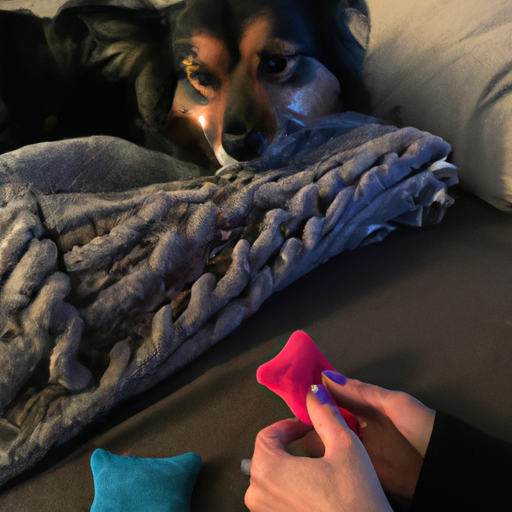Understanding Your Dog’s Anxiety
As a caregiver, you play an important role in your dog’s life. Your dog’s anxiety might be perplexing to you, almost elusive. You might wonder why your usually cheerful buddy is now acting restless, avoiding eye contact, or excessively barking.
There are several reasons why dogs develop anxiety:
- Separation from their owners
- Changes in environment
- Aging
- Past traumatic experiences
Understanding the root cause of your dog’s anxiety is the first step in addressing it.
Recognizing Signs of Anxiety in Dogs
You should be able to catch subtle changes in your dog’s behavior. You are the closest person to them, after all. Here are some signs to look out for:
- Excessive barking or howling
- Pacing and restlessness
- Trembling or shivering
- Destructive behavior
- Aggression
- Avoidance or hiding
Remember, these signs might also indicate other health issues. Consult with a vet to rule out any physical ailments.
Techniques to Alleviate Your Dog’s Anxiety
As a caregiver, your dog’s well-being is your top priority. Here are some techniques you can use to alleviate your dog’s anxiety:
- Create a Safe Space: Designate a quiet area in your home where your dog can retreat when feeling stressed.
- Exercise Regularly: Regular physical activity can help reduce feelings of anxiety.
- Behavioral Training: Train your dog to cope with anxiety triggers. This might take time and patience, but it’s worth it.
- Comforting Toys: Invest in anxiety-reducing toys and calming beds.
Consulting with a Professional
Your efforts might sometimes fall short, and that’s okay. Dealing with an anxious dog can be overwhelming. Do not hesitate to consult a professional. A behaviorist, trainer, or vet can provide valuable insight into your dog’s condition and suggest applicable treatment plans.
| Professional | Service |
|---|---|
| Behaviorist | Provide strategies to modify behavior |
| Trainer | Helps with obedience and anxiety-related training |
| Vet | Can recommend medication if needed |
Natural Supplements for Dog Anxiety
Some natural supplements are known to calm anxious dogs. Remember, always consult your vet before introducing any new supplement into your dog’s diet.
- Chamomile: Known for its calming properties.
- Valerian Root: Helps to reduce nervousness.
- L-Theanine: Promotes relaxation and reduces irritability.
FAQs
Q: Can dogs sense their owners’ anxiety?
A: Yes, dogs can pick up on their owners’ emotions, including anxiety.
Q: How long does it take to treat a dog’s anxiety?
A: The time it takes to treat a dog’s anxiety varies based on the severity and the dog’s responsiveness to treatment.
Q: Can I leave my anxious dog alone?
A: It’s not recommended to leave an anxious dog alone for long periods. They might engage in destructive behavior as a way to cope.
Q: Should I punish my dog for anxiety-related behavior?
A: No, punishment can exacerbate the anxiety. Instead, focus on positive reinforcement and training.
Remember, patience is key when dealing with an anxious dog. With time, love, and proper care, your furry friend will surely get better.



